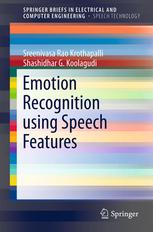

Most ebook files are in PDF format, so you can easily read them using various software such as Foxit Reader or directly on the Google Chrome browser.
Some ebook files are released by publishers in other formats such as .awz, .mobi, .epub, .fb2, etc. You may need to install specific software to read these formats on mobile/PC, such as Calibre.
Please read the tutorial at this link: https://ebookbell.com/faq
We offer FREE conversion to the popular formats you request; however, this may take some time. Therefore, right after payment, please email us, and we will try to provide the service as quickly as possible.
For some exceptional file formats or broken links (if any), please refrain from opening any disputes. Instead, email us first, and we will try to assist within a maximum of 6 hours.
EbookBell Team

4.4
32 reviews“Emotion Recognition Using Speech Features” provides coverage of emotion-specific features present in speech. The author also discusses suitable models for capturing emotion-specific information for distinguishing different emotions. The content of this book is important for designing and developing natural and sophisticated speech systems. In this Brief, Drs. Rao and Koolagudi lead a discussion of how emotion-specific information is embedded in speech and how to acquire emotion-specific knowledge using appropriate statistical models. Additionally, the authors provide information about exploiting multiple evidences derived from various features and models. The acquired emotion-specific knowledge is useful for synthesizing emotions. Features includes discussion of: • Global and local prosodic features at syllable, word and phrase levels, helpful for capturing emotion-discriminative information; • Exploiting complementary evidences obtained from excitation sources, vocal tract systems and prosodic features in order to enhance the emotion recognition performance; • Proposed multi-stage and hybrid models for improving the emotion recognition performance. This brief is for researchers working in areas related to speech-based products such as mobile phone manufacturing companies, automobile companies, and entertainment products as well as researchers involved in basic and applied speech processing research.